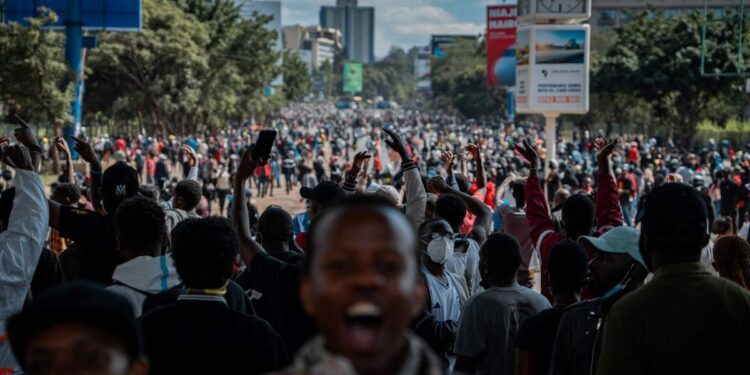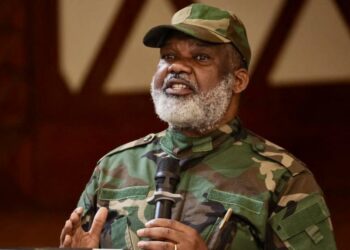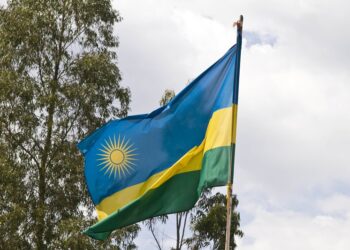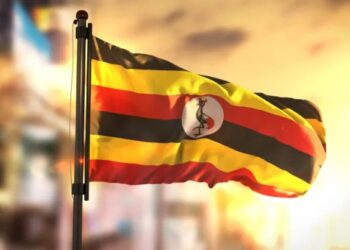Kenya, East Africa’s dominant economy, has grappled with escalating living costs that have spiked food prices and other commodities. The nation also owes billions of dollars in foreign and local debts, spending a sizeable chunk of its revenue repaying its creditors. But its government is desperate to stave off default. The country’s staggering $80 billion in domestic and foreign public debt accounts for nearly three-quarters of Kenya’s entire economic output, according to a recent report from the United Nations Conference on Trade and Development. Interest payments alone are eating up 27 percent of the revenue collected. The International Monetary Fund (IMF) expressed concern about a “significant shortfall” in Kenya’s “tax revenue collection” while urging its government to consider measures to shore up its earnings to reduce borrowing.
Analysts note it wasn’t just loans that got Kenya into its fiscal predicament. The country was hard hit by the COVID-19 pandemic and has also suffered from the fallout of Russia’s war on Ukraine, which has seen global food and energy prices rise. Climate change-induced floods have also hurt the country’s economy. In impassioned remarks in April, U.N. Secretary-General Antonio Guterres said, “The world cannot afford to continue throwing developing countries’ plans and futures onto a raging bonfire of debt.” He said around 40% of the world’s population now lives in countries that spend more on interest payments than health or education. In Kenya’s case, its government took out vast loans after a period of economic expansion in the early 2000s to cover the costs of infrastructure projects, including roads, railways, massive dams, and rural electrification. This latest global debt crisis cycle, however, which is considered to be the worst on record, was precipitated by events far beyond any single country’s control. Complicating matters are Kenya’s other economic problems. Corruption, cronyism, financial mismanagement, and the vestiges of colonialism have hobbled Kenya’s once-impressive economic development and exacerbated class and ethnic inequalities.
Under the leadership of President William Kipchirchir Samoei Arap Ruto, Kenya has one of the largest consumer markets in Africa. In 2020, household final consumption was 76.3 billion U.S. dollars, up from 28.2 billion U.S. dollars in 2009. A rising middle class has driven the retail market as well as e-commerce activities. In 2021, e-commerce revenue is projected to reach more than 1.5 billion U.S. dollars. However, according to the World Bank, Kenya’s growth is projected to reach 5.2% on average during 2024–2026, mainly driven by the private sector as business confidence strengthens and the public sector continues to scale back. Kenya’s growth is also expected to benefit from the implementation of the recently signed trade agreements under the European Union Economic Partnership Agreement and the African Continental Free Trade Area. Real Gross Domestic Product (GDP) expanded by 5.6 percent in 2023, compared to a revised growth of 4.9 percent in 2022. The positive growth was notable across most sectors of the economy. The agriculture, forestry, and fishing sectors grew by 6.5 percent in 2023, marking a recovery from the 1.5 percent contraction recorded in 2022. This recovery was mostly attributed to favorable weather conditions that prevailed throughout most of the year.
Why are people protesting?
Protests are important, an expert said. They can influence a government or a body of authority to respond to popular interests and injustice. Through protests, a government can be forced to address service delivery concerns, corruption, labor disputes, extrajudicial and summary executions, and education matters, and to abandon dictatorial tendencies. In some countries, such as Tunisia, Egypt, and Libya, protests collapsed regimes. According to Westen K. Shilaho, Senior Research Fellow, Institute for PanAfrican Thought and Conversation (IPATC), University of Johannesburg, Kenya’s political history is marked by mass protests that date back to the colonial period and continued into independence. Amid police crackdowns, Kenyans protested against political assassinations and autocracy during the tenures of the country’s first president, Jomo Kenyatta, and his successor, Daniel Moi. Through a constitutional amendment, Moi turned Kenya into a one-party state in 1982, which heightened political tensions. Later that year, Kenyans protested in Nairobi in support of an attempted coup against Moi as opposition politicians and civil society sought a return to political pluralism. Countrywide protests were held in 1990. This agitation, coupled with pressure from civil society, religious groups, and western donors, forced Moi to accede to multiparty politics in 1991. In 1992, mothers of political prisoners held an 11-month hunger strike in Nairobi to demand the release of their sons. Protests against presidential results in 2007 led to a horrific crackdown. More than 1,100 people were killed, several of them extrajudicially, by the police. Odinga had disputed Mwai Kibaki’s win. Protests and summary executions also followed the 2013 and 2017 announcements of presidential election results. Protests have returned to the streets of Kenya’s towns and cities as the country gets to the latest stage of the slow-motion revolution it has been undergoing for over 40 years. Animated by anger over the state’s arrogance, corruption, and long-running neglect of their needs as currently manifested in its tax proposals, a new generation has taken up the fight, and it is glorious to behold.
Kenya’s Finance Bill of 2024 was supposed to increase government revenue through taxes, satisfying a condition of the IMF loan. But Kenyans already struggling with high inflation and organizing on social media came out in cities including Nairobi, Mombasa, Homa Bay, and Kisumu to condemn the bill after it passed in parliament. The youthful demonstrators, popularly referred to as Gen Zs—in reference to the term generally used to describe those born during the late 1990s and early 2000s—showed up in huge numbers, vowing to ensure that their discontent did not end with just a hashtag or meme. This spontaneous, organic movement was significant in three important ways. One, it was leaderless; there were no politicians or political leaders leading the pack, nor was it associated with any political party. Two, it was driven largely by social media; the call to protest was communicated mainly via social media platforms like X and Tik Tok. Three civil society organizations that, in the last couple of decades, have been the traditional torchbearers of matters related to good governance and accountability were largely absent or invisible during the protests. Elected in 2022, pledging to cut corruption, shore up the country’s faltering economy, and help the poor, the embattled Mr. Ruto now faces an unprecedented rebellion against a bill he says is an essential part of his plan to build the nation. An appropriate balance of individuation and integration is optimal both for the cultivation of human individuals and for a vibrant and prosperous society. Technology takes its place in this picture. In this way, technology is aligned with structural social power and works in a similar way to social institutions that reify certain practices by making them seem natural and obvious. At the same time, this power is productive for individuals encountering technology. Graeme Kirkpatrick, in his Technology and Social Power, says so much on this.
Gen Z and Urbanization Paraphernalia
There are lucky and unlucky generations. Generational inequality really kicks in if those paying for the elderly are unlikely to see the same benefits. Older adults are advantaged because they have publicly provided pensions, health care, food stamps, housing subsidies, tax breaks, and other benefits that younger people do not. What is more, the younger groups, for a variety of reasons, are unlikely to receive the same level of benefits (see Globalization, Modernity, and the City by John Rennie Short, p. 270). There are more than 40 ethnic groups in Kenya. Kikuyu is the biggest, accounting for 17 percent of the 54 million population, followed by Luhya (14%), Kalenjin (13%), Luo (11%), and Kamba (10%). Meanwhile, the government of President William Ruto has managed to do what generations of politicians in the East African nation have failed to do: unite huge numbers of Kenyans beyond ethnicity and party. Kenyan youth are also deeply aware of the fact that the decisions made by the current crop of old-school politicians, many of whom have been accused of corruption and other crimes, will deeply affect their future, and they are determined not to let that happen. Remember, this is also the generation whose parents suffered under the IMF/World Bank-induced Structural Adjustments Programmes (SAPs) of the ’80s and ’90s (now reincarnated in the Finance Bill 2024) when the state withdrew from providing essential services, such as health and education, a gap partially filled by NGOs and church organizations. SAPs resulted in what is often referred to as the “lost development decade” in Africa and created a stressed and deeply impoverished generation with reduced access to basic services that make countries grow and prosper. Poverty and inequality levels rose as people struggled to meet their basic needs.
Historically, an association has existed between urbanization and economic development. Countries with higher levels of urbanization tend to have higher levels of economic development. What is not clear is the direction of causality—the extent to which economic development promotes economic development. In developed countries, although urbanization was largely an outcome of economic development, it was a reciprocal arrangement in which the urbanization that was driven by economic growth in turn stimulated further economic development (see Urbanization: An Introduction to Urban Geography, written by Paul L. Knox and Linda McCarthy, 2nd ed., p. 177). Lena Gutheil, a researcher at the German Institute of Development and Sustainability (IDOS), one of the world’s leading research institutions and think tanks for global sustainable development, noted that: Previous research shows that cities facilitate protests for a number of reasons. Firstly, cities are dense. This leads to lower organizational and transport costs and makes participation for individual protesters less risky. Studies have found that there is a correlation between city size and the occurrence of protests. Secondly, protests in capital cities are particularly effective due to their political significance and symbolic power, as the example of Nairobi shows. Protesters could physically storm parliament, where the decision-makers are. This led to an immediate reaction from the government when, a day later, President William Ruto withdrew the finance bill. Thirdly, those who arrive in cities are often disappointed with the lack of government services. Many young Kenyans move to cities in search of economic opportunities and better services. But cities are largely not prepared for their rapid growth. It is estimated that more than half of all Kenyan city dwellers live in informal settlements. This creates grievances. While the urban dimension of the current protests is not surprising, the multi-ethnic nature of Kenya’s recent protests is.
Dynamics of Situation and Upholding Social Contract
The nation-wide protests put the lie to the inter-generational stereotype that the youth, represented by Gen Z, were apolitical, weak, and self-indulgent. Like their grandparents and parents’ generations when they were fighting for independence and democratization, they had reached a turning point when the burden of the crosses they were forced to bear became too heavy. The finance bill was the proverbial straw that broke the camel’s back for their generation and other segments of the Kenyan population. Ruto, whose rise to the presidency was largely propelled by youth voters, said in his address retracting the finance bill that he hoped to engage with young people in the country to listen to their ideas and proposals on how to solve the nation’s economic challenges. Furthermore, Lena stated that the turnout of young protesters in Kenya pushes back against the idea that young people are apathetic and not interested in politics. But it would be too early to announce a new age of issue-based activism in which participation cuts across ethnic and demographic lines. Ethnic identities are not stable; they can be mobilized for different causes at different moments in time. For example, political rivalry between ethnic or regional factions is common during elections. It remains to be seen, too, whether Generation Z can solidify its position as a politically influential demographic and can resist being co-opted. Young people are not a homogeneous group but have different interests.
In addition, Samuel Misati Nyandemo, a senior economics lecturer at the University of Nairobi, said the Kenyan government, having withdrawn the controversial finance bill, now has a tough road ahead. “The government should try to strike a balance between raising revenues and addressing the cost of living and doing business in the midst of entrenched corruption, impunity, and wastage of public resources,” he said. Kenya, he warned, might not be the last African country where frustrations boil over and citizens take to the streets. Whether or not the Ruto administration finds a way to manage its debt payments, the problem is that Kenyans don’t feel that their government is looking out for their best interests. That has played out in protests over the economy, but those circumstances are a product of Kenya’s political culture and international financial institutions that have failed developing countries.
Well-targeted social protection interventions are essential as policies are implemented towards market-enabled solutions for effective interactions of demand and supply. Developing the right norms and mechanisms of social accountability necessarily requires making politics personal. Individual politicians and bureaucrats must feel socially obligated to adhere to the formal stipulates of the constitution and related institutions. To this end, norm enforcement must be personalized. To be blunt, thieves and murderous acts should not be celebrated. Equity is not some esoteric concept but a lived, brutal reality; 0.1 percent of Kenyans own more wealth than 99 percent of the population, while 36.1 percent (2015) of the country’s population live below the international poverty line. Kenya has to address inequity in the distribution of resources. That requires more than rhetoric and good documents. The Gen Z uprising in Kenya is part of a much larger African story. The youth bulge, which will give the continent a quarter of the world’s population and a third of its labor force by 2050 and 40 percent of the global population by 2100, is a huge historic asset. But it can only be turned into a demographic dividend if massive educational, employment, and entrepreneurial opportunities are cultivated—and fast. Otherwise, it will become a demographic nightmare, a recipe for mass unrest, insecurity, and instability that will profoundly disrupt both the continent and the world.
ـــــــــــــــــــــــــــــ
This article expresses the views and opinions of the author and does not necessarily reflect the views of Qiraat Africa and its editors.



























































